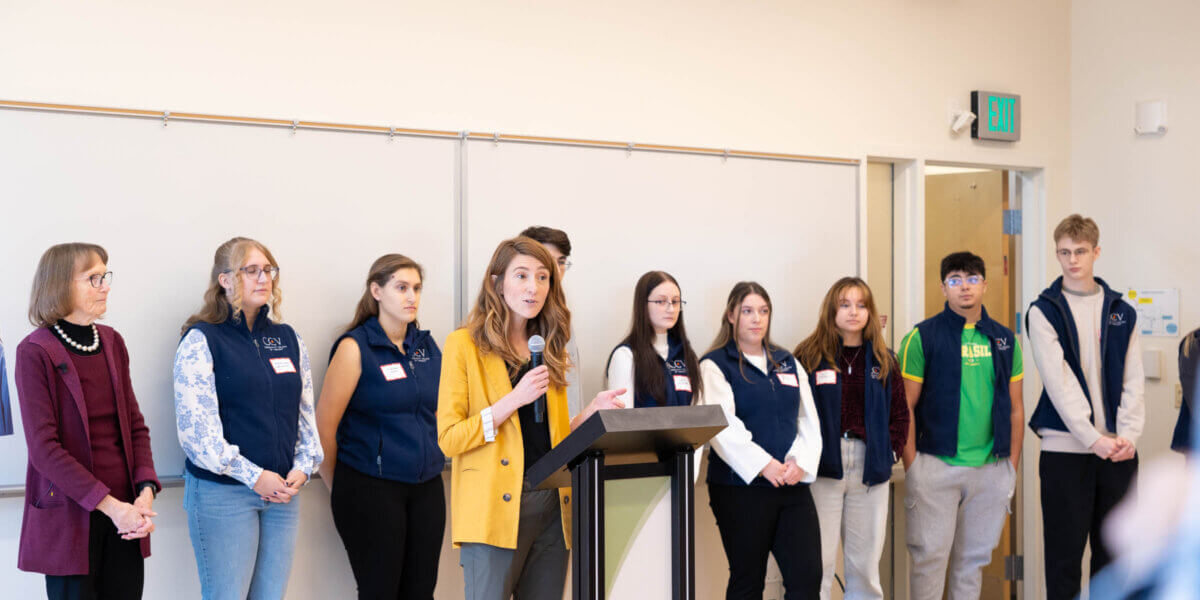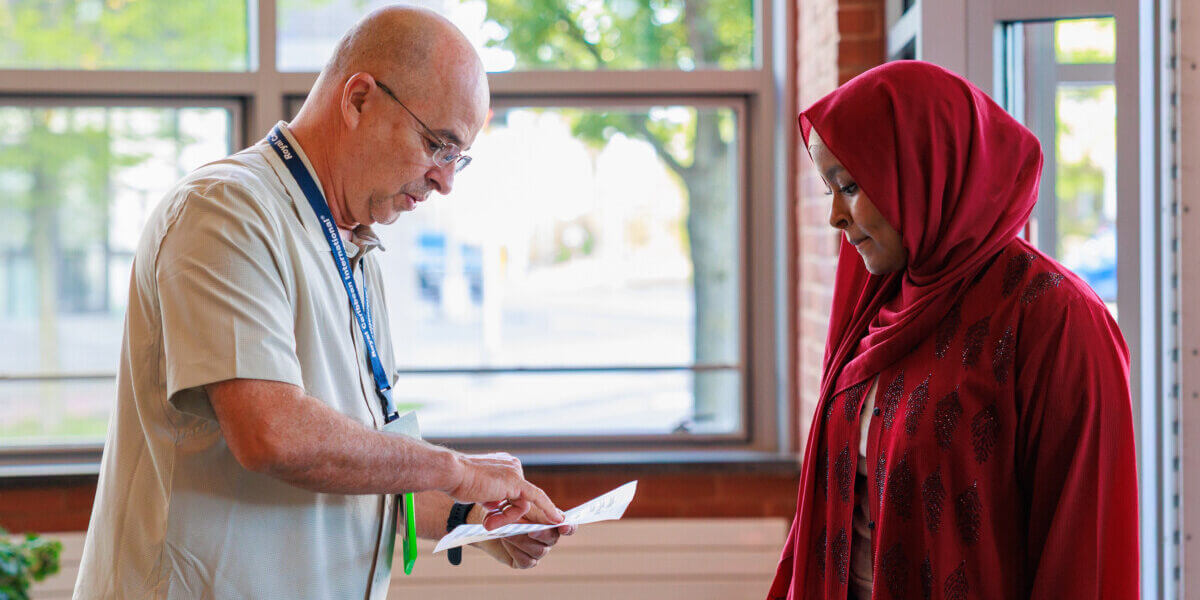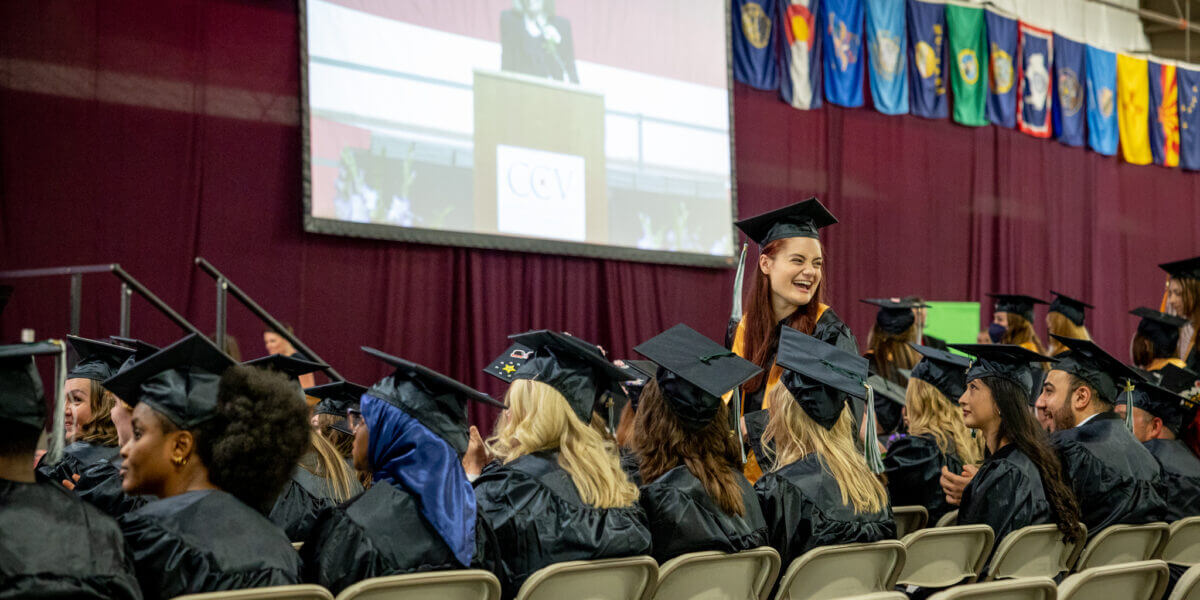Photos by Josh Larkin
Dr. Bryan Alexander is a futurist—as in, he studies what’s next. But on Friday morning at CCV’s annual Faculty Summer Institute at the Lake Morey Resort in Fairlee, the conversation was all about what’s right now.
Alexander is a consultant, author, teacher, and writer, and the bulk of his work is focused on the relationship between technology and education. He spoke at the two-day conference, devoted to professional development for CCV instructors, about “Digital Literacy and Education in 2018,” where he inspired faculty to share some of the most salient challenges and questions digital literacy presents to their students and classrooms today.
The following instructors were recognized at the Faculty Institute for their outstanding contributions to CCV classrooms.

Emily Gannon, Brattleboro
“Lean on your colleagues, lean on your support staff, and lean on your students, who bring such rich perspectives to the classroom.”

David White, Online and Montpelier
“I try to find that sweet spot between humility and audacity.”

Kristie Bush, Montpelier
“A student told me that [the idea of] having a growth mindset changed her life.”

Melissa Holmes, Rutland and Bennington
“If I have anything to say, it’s that I thank the students.”
But first, what exactly is meant by the term ‘digital literacy’? According to Alexander, there’s not a lot of consensus around this, at least among experts in his field. A quick Google search yields definitions like these: “the ability to find, evaluate, utilize, share, and create content using information technologies and the Internet” (Cornell); “an individual’s ability to produce clear information through writing and other forms of communication on various digital platforms” (Wikipedia); “the ability to use information and communication technologies to find, evaluate, create, and communicate information, requiring both cognitive and technical skills” (American Library Association via Education Week).
Alexander is working to address this question with a research group at the New Media Consortium (NMC), an international organization studying the intersection of technology and education. He began Friday’s presentation by describing the results of two major studies he has undertaken with that group.
While there may not be a universally accepted definition of the term, concedes Alexander, there are a few common traits of digital literacy that most, from educational experts to the United Nations to corporations like Mozilla, can agree on. He summarized the findings of NMC’s study into three main points. One, there’s a sequence in common, which begins with media literacy, continues to information literacy and then digital literacy. Two, all three types of literacy require a combination of technical, personal, and social capabilities. And three, learners are social and participatory; as in, digital literacy allows students to be makers and creators in unprecedented ways.
Alexander noted that CCV faculty, like community college faculty around the country, are responsible for teaching a huge variety of skill levels when it comes to digital literacy. For this reason, he drew a comparison between CCV instructors and public librarians. “The people in the U.S. who do the most teaching of digital literacy, hands down, are public librarians,” he said. “I’ll walk in and say, ‘Hi, I’d like some help shooting a 360-degree video,’ and they’ll help me. And then my father, who’s about 90, walks in, and he’ll say, ‘That’s a mouse, and I need to know the next step,’ and they’re happy to help him. And nobody talks about this—public librarians are absolute heroes.” So too, he said, are community college instructors.
When Alexander invited instructors to share their most pressing concerns about the way digital literacy affects learning at CCV, the discussion resulted in a long list of questions, opinions, and ideas. Here are just a few:
-How can we be intuitive about the next phase of technology?
-How do we teach to make accessibility for everyone a reality?
-In the world of fine arts, does using a certain technology make me inauthentic or a fraud? Is my art less meaningful?
-What is the etiquette of digital communication? What is the proper way to address instructors and fellow students in an online world, and what is the proper language for academic discourse?
-How do you build personal relationships with students when they’re online?
-Are we educating our students today to meet the artificial intelligence world of tomorrow?
-How do we manage information overload and the resulting information “tension”?
-There are societal issues around older generations—how do we support their transition into the age of digital learning?
-When students are passive recipients of information, they are passive learners. Part of the mission of CCV is to teach students to become active learners.
-There is a set of challenges associated with understanding and adhering to copyright laws.
-Fake news presents a major social and educational challenge.
As the group broke for lunch, Alexander encouraged faculty to continue talking about these topics with one another, and continue asking the questions that will affect their teaching, their classes, and their students. He summarized the morning’s conversation as a “snapshot of all of you at this moment in time, how you’re facing the digital world, the problems you see, the advantages…almost an ethnography of where you are now.”






